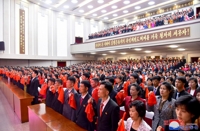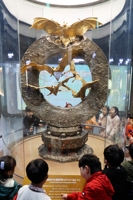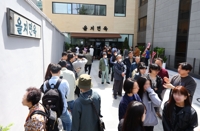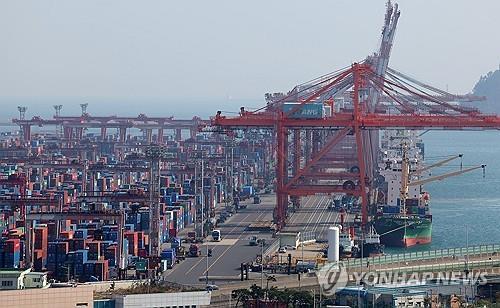(EDITORIAL from Korea JoongAng Daily on Nov. 24)
More bullying from Beijing
China is once again pressuring South Korea over the Terminal High Altitude Area Defense (Thaad) missile shield that was deployed in Seongju, North Gyeongsang. Chinese Foreign Minister Wang Yi said that he achieved some results in his meeting with South Korean Foreign Minister Kang Kyung-wha in Beijing Wednesday. The results Wang seemed to refer to was a partial agreement between the two ministers on finding a step-by-step resolution of the conflict over the Thaad deployment.
At a press briefing Thursday, Minister Kang said she plans to deliver China’s demands to the Ministry of National Defense after she returns. According to other diplomatic sources, Beijing made quite specific demands: that Seoul explain to Beijing the technical side of the Thaad battery, allow China to conduct an on-site inspection on the Thaad battery in Seongju, and set up a barrier to block the Thaad radar from spying on Chinese territory. Those were conditions for the normalization of South Korea’s relations with China.
China’s requests are totally outrageous. First of all, the Thaad battery is a pivotal tool for South Korea to defend itself against North Korea’s missiles and nuclear weapons. If China insists on such absurd requests, that constitutes a brazen interference in our domestic affairs.
Moreover, the Thaad system is not owned by our forces. It is a U.S. military asset. Also, the Thaad base is under the control of the U.S. Forces Korea. Therefore, China’s demands do not make sense. As we have repeatedly pointed out, China’s intercontinental ballistic missiles are off the range of the Thaad radar, which can only cover a range of 800 kilometers (497 miles).
Our government’s position is an even bigger problem. If Kang’s words are correct, the defense ministries of both countries are to hold a preliminary meeting to discuss the U.S.-run Thaad battery before a summit in December between President Moon Jae-in and his Chinese counterpart Xi Jinping.
The Moon administration made the critical mistake of making three foolish promises. On Oct. 31, Seoul assuaged Beijing’s security concerns with the so-called three nos, meaning no additional Thaad deployments, no joining of a broader U.S.
missile defense system and no Korea-U.S.-Japan military alliance.
China has mentioned a “phased settlement” of the Thaad row, but our government does not explain what that means. The government must make its position clear and abandon its ambiguous attitude quickly. China must first help with the denuclearization of North Korea rather than trying to find fault with the Thaad deployment.
(END)
-
 S. Korea marks 30th anniv. of Korean Pavilion at Venice Biennale with contemporary art
S. Korea marks 30th anniv. of Korean Pavilion at Venice Biennale with contemporary art -
 Artist Lee Bae captures ethereal Korean aesthetics at Venice Biennale
Artist Lee Bae captures ethereal Korean aesthetics at Venice Biennale -
 Ateez member Yunho throws first pitch at MLB match between Dodgers, Mets
Ateez member Yunho throws first pitch at MLB match between Dodgers, Mets -
 Gov't likely to accept university chiefs' request to lower med school enrollment quota
Gov't likely to accept university chiefs' request to lower med school enrollment quota -
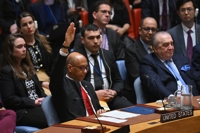 S. Korea supports resolution backing U.N. membership of Palestine
S. Korea supports resolution backing U.N. membership of Palestine
-
 Artist Lee Bae captures ethereal Korean aesthetics at Venice Biennale
Artist Lee Bae captures ethereal Korean aesthetics at Venice Biennale -
 S. Korea marks 30th anniv. of Korean Pavilion at Venice Biennale with contemporary art
S. Korea marks 30th anniv. of Korean Pavilion at Venice Biennale with contemporary art -
 Gov't likely to accept university chiefs' request to lower med school enrollment quota
Gov't likely to accept university chiefs' request to lower med school enrollment quota -
 Looming weekly closure of major hospitals feared to worsen medical service crisis
Looming weekly closure of major hospitals feared to worsen medical service crisis -
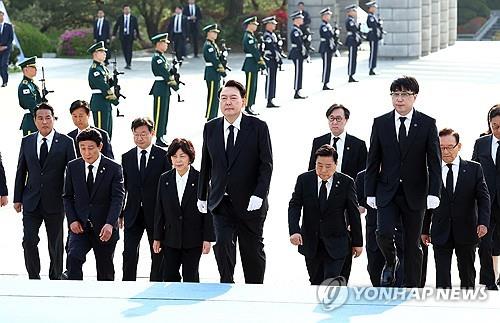 Yoon's approval rating sinks to lowest point since taking office
Yoon's approval rating sinks to lowest point since taking office
-
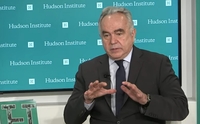 U.S. will take steps for three-way engagement on nuclear deterrence with S. Korea, Japan: Campbell
U.S. will take steps for three-way engagement on nuclear deterrence with S. Korea, Japan: Campbell -
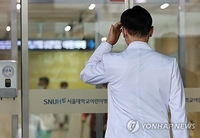 Looming weekly closure of major hospitals feared to worsen medical service crisis
Looming weekly closure of major hospitals feared to worsen medical service crisis -
 Author of ADOR's 'internal document' refutes allegations of spinoff plot
Author of ADOR's 'internal document' refutes allegations of spinoff plot -
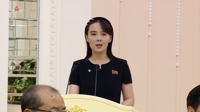 N.K. leader's sister slams joint S. Korea-U.S. military drills
N.K. leader's sister slams joint S. Korea-U.S. military drills -
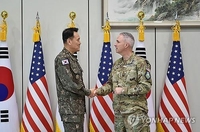 U.S. SPACECOM commander says N.K.'s satellite launch violates U.N. resolutions
U.S. SPACECOM commander says N.K.'s satellite launch violates U.N. resolutions
















